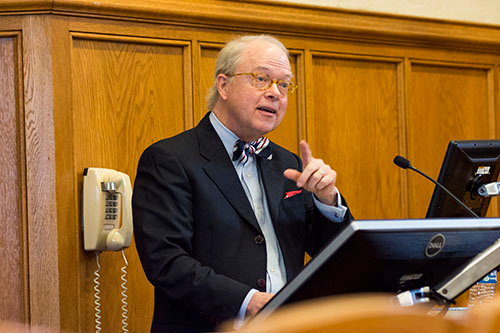This website uses cookies
We use cookies to ensure that we give you the best experience on our website. If you continue to use this site we will assume that you are happy with it.
Gregory S. Alexander, the A. Robert Noll Professor of Law at Cornell Law School, has written and co-authored eight books on property law over the past thirty years. But his latest book, Property Law and Human Flourishing (Oxford University Press, 2018) breaks new ground in the field with a novel theory on property law.

Greg Alexander Book Celebration
The goal of property law, Alexander argues in the book, is to promote human flourishing for everyone. Alexander proposes that property owners don’t just have rights, but obligations to others who are members of communities that allow them to flourish.
The publication of Alexander’s book was celebrated on October 25 at Myron Taylor Hall with a panel discussion featuring three commentators from Cornell Law School, Harvard Law School, and the University of Toronto.
“In the very beginning, he says that his book presents an entirely original theory of property,” said Joseph Singer, the Bussey Professor of Law at Harvard Law School. “That’s a remarkable claim to make, and in my view, he’s correct about that.”
Alexander explained that his book is not only an analysis of the obligations of property owners but also of the nature of human existence. “I understand human beings to be literally dependent, from the very moment of their birth all the way through their lives and until they die, on other persons,” he told a group of students and faculty at the celebration. “That is an inevitable fact.”
Private ownership of property is justified, he said, if it facilitates the opportunity for people to flourish. And people cannot lead flourishing lives without having certain capabilities, such as health and education, which they derive through their membership in communities.
Alexander applies this theory to a range of moral issues, from homelessness to reparations for the enslavement of African Americans. “Human flourishing is the criterion by which we can fruitfully analyze all of these incredibly massive problems,” he said.
What makes Alexander’s argument “brilliant,” according to Laura Underkuffler, the J. DuPratt White Professor of Law at Cornell Law School, is his idea that the obligation property owners owe is not rooted in the needs of others, but in their own needs. As Alexander explains, if we value our own lives, we must maintain the conditions that sustain our lives as well as possible, and that includes supporting the communities to which we belong, Underkuffler said.
“This approach does not require that people be ‘altruists’ in order to recognize their obligations to communities,” she said. “This approach roots obligation to others in our own needs, rather than in some kind of forced and contestable recognition of the needs of others.”
Singer said the power of the book derives from its exploration of the broader questions of humanity. “Greg Alexander teaches us that property law is not about defining what property is, but about deciding who we are, what obligations we have to each other, and what it means to be human,” he said. “We are not wise yet, but with Greg Alexander’s help, we are learning.”